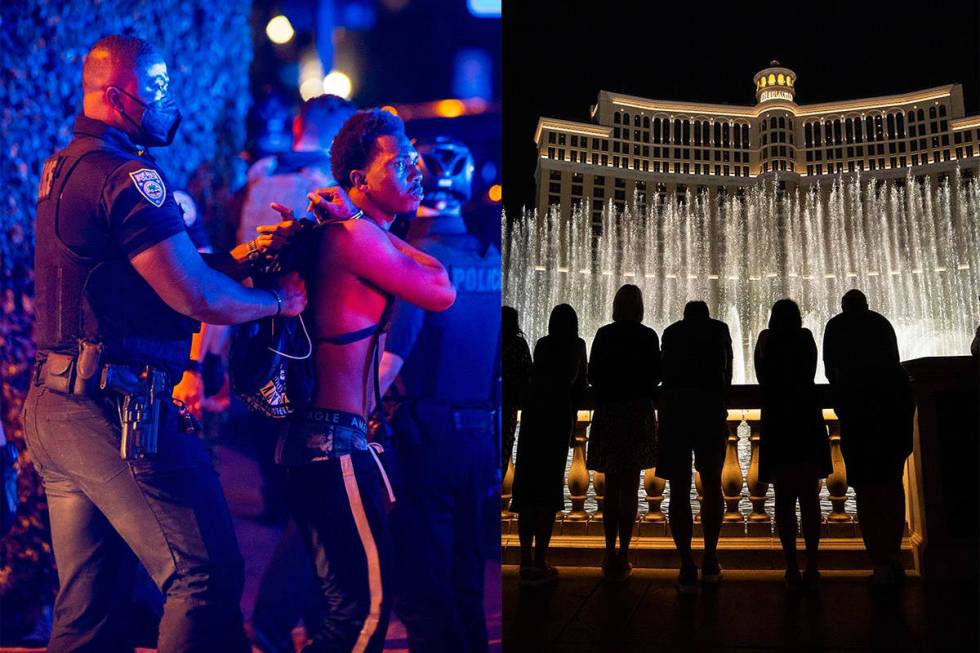Miami Beach-style pandemonium is unlikely in Las Vegas. Here’s why.

Massive crowds of tourists, the size of which hadn’t been seen in more than a year, descended over the weekend.
In Las Vegas, their arrival was celebrated by experts, business owners and visitors alike as the beginning of the city’s much-anticipated renaissance.
In Miami Beach, it was met with curfews and police firing pepper balls to disperse gatherings.
So what’s behind the difference in this tale of two cities?
“I think people are used to Las Vegas, especially the Strip and downtown, being much more controlled environments,” says David Schwartz, UNLV gaming historian and tourism expert. “I think everybody accepts when you go into a casino, there’s certain things you can’t do, and I think that makes it much easier to enforce a lot of these things.”
Despite the “Sin City” moniker and the idea that anything goes, it’s important to remember that the majority of properties on the Strip are owned by a few corporations that don’t want to run afoul of the Nevada Gaming Commission. There’s too much at stake for these companies to let crowds, or even individuals, get too rowdy.
“Obviously, ‘what happens here, stays here’ is a thing,” Schwartz says, “but the licensees have always taken regulation seriously, and they don’t tolerate people violating regulations, for good reason.”
Governors’ approaches
While Gov. Steve Sisolak just recently increased capacity limits to 50 percent and masks are still mandatory in Nevada, Gov. Ron DeSantis has long sought credit for Florida’s relatively few safety restrictions throughout the pandemic.
“The current perception of the public is that Florida is very open,” says Amanda Belarmino, an assistant professor at UNLV’s William F. Harrah College of Hospitality, “so I think that may be attracting people … who are less likely to be diligent, not just about COVID restrictions, but restrictions in general.”
Many in the valley’s restaurant scene embraced the arrival of tourists and the return to normalcy that presented over the weekend. In Miami Beach, though, restaurants are being closed by the very crowds they need to survive. The street parties that have hit the city’s entertainment zone have led to an 8 p.m. curfew that’s in effect Thursdays-Sundays through April 12. During those hours, restaurants are only allowed to be open for delivery.
The Miami Beach unrest exposes fundamental differences between the party destinations, says Belarmino, who spent 15 years in the hospitality industry, including six on the Strip, before entering academia. While Miami Beach has its share of bars and nightclubs, one of its biggest draws is the beach itself, which can be difficult to regulate and patrol.
“The fun and exciting things to do in Las Vegas are on the properties, so they’re going to be controlled,” she notes. “They’re going to be under surveillance. They’re going to be under security.”
That isn’t to say things don’t get out of hand here. But when reports of a rise in violent crime on the Strip surfaced last fall, Las Vegas police launched a three-month operation that resulted in more than 1,200 arrests. After all, the last thing a city wants is for its biggest economic engine to be deemed unsafe.
Be prepared
“I think the lesson to learn from (Miami Beach) for Las Vegas, though, is to be prepared,” Belarmino says. “As we move forward, we need to continue to do what we do well.”
Reports and images of visitors returning to Las Vegas en masse, without incident, could create a snowball effect, Schwartz says, with people seeing those crowds and wanting to be a part of them. It’s still too soon, though, for him to say the city has put the past year in its rear-view mirror.
“I think if we get past the next two weeks, which I think are going to be critical, and there’s no spikes on infections, and airline travel is safe, if that happens, then we would say we’re through the worst of it,” Schwartz says. “But I think we have a little bit more to go before we can really make that call.”
It’s just a matter of when, he adds, not if.
“I think Las Vegas, as a brand, is definitely still very vibrant.”
Contact Christopher Lawrence at clawrence@reviewjournal.com or 702-380-4567. Follow @life_onthecouch on Twitter.